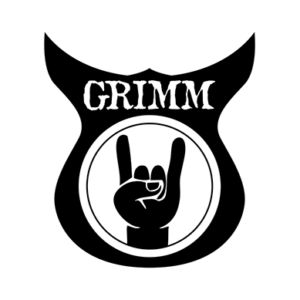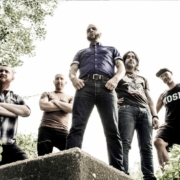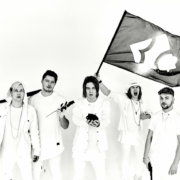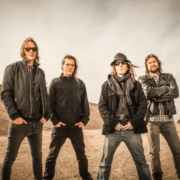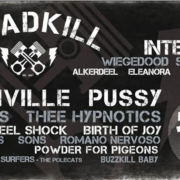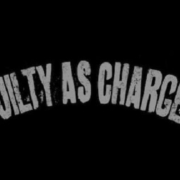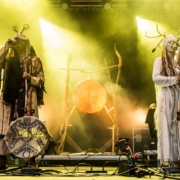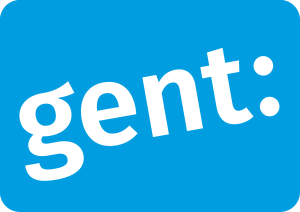Heilung, which translates to healing in German, is defined by disconnecting from the artificial barriers of modern life, be it religion, class or politics, and tapping into a more universal tribal spirit. Growing up, all three musicians were drawn to their local living history ‘the viking period’.
Heilung was founded in 2014 by Kai Uwe Faust (a tattoo artist specializing in Old Norse tattoos) and Christopher Juul (Valravn, Euzen). Later, Juul‘s girlfriend, Maria Franz (also a member of Euzen), completed the trio.
We had the chance to talk with this lovely and very unique band on Hellfest.
Fun fact, Maria also reads our webzine!
Hi, how are you all doing?
We’re fine, a bit tired from trip to here. The traffic around paris was terrible, we came from Graspop.
Congratulations, last year your performance at Midgardsblot was listed as one of the ten best performances of 2017 by Metal Hammer and this year Heilung was nominated in the Best Underground Band category for a Metal Hammer Golden Gods Award in 2018.
Last year, 2 friends (also reporters from GRIMM) attended Midgardsblot, they told me about your band, that’s why I was curious to listen to your music and I look forward to your performance tomorrow.
Thank you, we hope you enjoy it!
How did you meet each other, because you are all from different countries (Denmark, Norway and Germany)?
Christopher: The band was put together around 2014, but we knew each other from before. In 2014 Kai came to my studio to do some recordings of his poems. And for these recordings Kai would give me a free tattoo, but I haven’t got one yet (everyone laughs).
Kai is still working on the design of the tattoo, but this assignment has been the start of Heilung. We didn’t choose Heilung ourselves, Heilung choose us. It has grown out of nothing.
Kai: Currently having time is the problem. A tattoo must be well thought out.
Of course, Kai you are also a tattoo artist specializing in Old Norse tattoos?
Kai: Yes, I am. Sometimes people come to my shop and they don’t know what they want. Taking your time is very important. I only do custom work. I ask my clients that they bring images of what they like or I ask for their dreams or visions and I make a design for them. Sometimes I get the question to symbolize protection symbols and talismans. Every tattoo I make is unique, I do not put the same tattoos on different people. I do not work like an regular tattoo shop. I don’t have books were they can point at a tattoo.
Christopher: Kai’s shop is the place to be if you want Nordic art and symbolism. Part of a wider Neo-Nordic movement that emphasizes ornate designs featuring deer, warriors and ancient symbols to be concrete. Heilung started as a combination of the two studios. The studio I come from does world, ethnic and pagan music (Lava studio, Copenhagen since 2003), we melted our thoughts together on the Norwegian subject. We have created something that is not only an orchestra or band, but also a vision visual and audio-visual.
Kai, have there been any fans who asked to tattooed your logo of Heilung in their bodies?
Kai: There have been request but at the moment no, for example someone asked me from South Afrika. I’m proud that they ask. In the future I’ll make those dreams come true.
How do you categorize your music?
Christopher: Amplified history, experimental folk-metal. Kai uses Tibetan throat singing, it is deeper than any metal singer you’ll ever hear. At the same time, you also have this whistle.
Which Nordic story or legend do you like the most?
Kai: I’ve been looking up those stories from when I was a child. I’m originally from the small town of Siegen in Germany, I grew up in a deeply Christian household where television was not allowed but books were welcomed. One book that particularly intrigued me contained images of tattooed nomadic warriors – the Scythians, who ruled the Eurasian steppes over two thousand years ago. I wear a Scythian-styled deer tattoo on my forearm (by Astrid Köpfler) as a tribute to these Iron Age warrior artisans who continue to fascinate me and inspire my epidermic talents.
Now that we are making more music with Heilung we are looking for inspiration again at the old sources. We use rune scripts that are preserved on old stones. We also use intuitive inspiration that comes to us through meditation, trans journeys and use of some mushrooms.
Maria: A couple of our songs are inspired by the Dynna stone (11th century, currently Oslo, originally Gran) inscriptions in Norway. It is of course difficult to pronounce the words and old lyrics correct we found. Like so many people, we interpret it in our own way. Many of the words have been forgotten and can have multiple meanings.
(Side note: The runic inscription from the Dynna stone reads: × kunuur × kirþi × bru × þririks tutir × iftir osriþi × tutur × sina × su uas mar hanarst × o haþalanti x
Translated to English, the inscription reads: “Gunnvôr, Þryðríkr’s daughter, made the bridge in memory of her daughter Ástríðr. She was the handiest maiden in Haðaland.”)
Christopher: We use words from a dead language, so it’s about the feeling. We sometimes do not know what it literally means, but of course have an idea of what it can be. The listeners can decide for themselves what it means to them as a feeling.
Do you have a ritual before going on stage?
Maria: Yes, but we do it on stage and not before. We form a circle and sometimes we invited the organizers from the festivals as well on stage. We preform an old Nordic ceremony. We read a poem that Kai has written and that is our call message to everybody. It’s about remembering that we are all brothers, beasts, stone and wind. We also have a shaman on stage that closes the circle.
Kai: We try to make people feel how it is to be surrounded by nature, to slaughter their own cattle, to build their own drum, to live from the earth. Every attempt to connect it to modern stuff that makes us sad is not important.
Castlefest in 2017 was a special event for you all. That’s the festival where you broke through and gained name recognition. You used for the first time hair, blood and bones for your life performance at Castlefest? How did you come up with this idea?
Christopher: We didn’t actually plan anything in detail. We started practicing two days before the venue. We had two days to get this show working and we put up the track and everything meshed together. On the second day, we had a costume test and none of us really knew how the other people were going to look because we didn’t plan it. We just said, put on something that makes you feel connected to yourself. Don’t make something you think looks cool, it has to feel real. We chanted and pounded on drums we painted with our own blood.
Maria: I want to explain something about our drum, we painted it with our own blood but it is not that we have cut our fingers or arms open, a friend who is a nurse has drawn our blood in a medical and hygienic way. It is such a magical feeling to paint something with my own blood and the color is so beautiful. During the construction and painting of our set and drum I was taken to another place that I did not expect, it was very meditative. It was a beautiful feeling. It is like a blood tie, we form a tribe.
Christopher: Everything comes with a sacrifice.
Do you make sacrifices?
Maria: Yes, every day little things. Regularly with food or before we drink something, we first give the ground a little sip to drink. It’s saying, ‘hey, nice to be here.’
Kai: Sacrificing something is making something sacred or holy. I have already participated in many different rituals through the years, meanly sun based rituals like the shamanic ritual like our for fathers did. The diverse and unique shamanic rituals speak a language of prayer, connection to the realms of spirit, harmony and guidance from the heart. And now at this festival season I do suggest making an sacrifice once in a while, it does not have to be an animal all the time. And it clearly doesn’t have to be a person or your own blood. But little things and it’s always a good feeling to say thank you to visual en invisible powers or realms. It is also a good feeling when you sacrifice something to a living person, being there for someone and that is also for me a sacrifice. Unfortunately this is something that has been lost in our time, many are thinking of themselves and surround themselves with technology, drugs and alcohol. The whole concept of making an act holy should be revived.
Christopher: Many of the things we show on stage are things that Kai has been doing for a long time, when we started with Heilung we thought ‘this is never going to happen’. You’d have to be crazy to listen to something like this, we thought we would never perform this stuff live. But our show turned into a theater piece or a concert of living history.
Maria: I remember coming home one day and hearing screams form our garden. I saw Kai standing in our garden half-naked and screaming. I said, ‘What the fuck have you guys been cooking up together?’
Christopher: But everything started with holding hands together in a circle. We are alive, this is what we do!
How was your performance yesterday at Graspop?
Maria: Amazing!
This is your first time at Hellfest? Are you nervous?
Christopher: This is our 4th performance live ever! This weekend alone we are doubling our live performances it seems.
How’s playing live going?
Christopher: Excellent, it is an adventure this far. We blew up our sound system yesterday. It is as we said before, everything comes with a sacrifice … apparently our amplifiers yesterday. We do play amplified history (smiles).
Maria: I love it. We are touring now with 14 people: us, make-up artists and technicians, … I feel very blessed to do this.
Is there a festival you really love to perform live one day?
Christopher: We are playing at this festival wright now, it’s Hellfest. We do not want to be at every major festival. We are looking for the festival where we can show who we really are and feel welcome and currently these are the 4 festivals where we have already played so far (including Hellfest tomorrow). As an example, Castlefest remains very special because the organizers are our friends and not many people know the festival but for us it was the perfect place to start and show who we are with our own rituals. The name is not important for us or the location, but the feeling that you get when you drive towards these festivals for example here on Hellfest it’s special. You see cars parked from miles away, wherever they want and this small village of Clisson has been transformed for a few days in something whole new for a few days.
You made two albums so far? Lifa, means life (I think) and what does Ofnir mean? Why the choice for these two names?
Kai: Lifa means ‘to live’ in old Norse and it’s a live album. It seemed the perfect title for our first album. On stage that’s also the place where I feel most alive.
Ofnir has two meanings: in old German you could say it translate to ‘aufhetzen’ (translation: encouragement), it brings something up inside of you. Ofnir is also the name of the dragon. In Norse mythology, ‘Ofnir’ (means malice striker) is a dragon who gnaws at a root of the world tree ‘Yggdrasil’.
‘Heilung’ means healing in German as well, it means cure. When we started I was thinking about how we would call this project. I went into meditation and this was the word that came forward. I proposed the idea to Christopher and Maria and they liked it.
The name goes back in many Nordic languages and means often the same thing: ‘curing’. And healing something or somebody goes back to the stone age and even older than that time. For example in Icelandic Heilun (without the g) also means healing.
Maria: The name is also reflecting that the music is very violent and intense, almost like it’s to much to bare, that you are pressured by it. But in the end you are relieved of those intense feelings and it’s calming you down. And that journey is like a healing process.
Christopher: In some of the songs we actually play with the audience heartbeat. We are doing that with riffs that are very similar to your heartbeat and raise or slow it down with our music. That’s why some of the songs are very long.
Maria: Many artist are using this technique for years, it’s nothing new. But playing with music instruments made by mother nature are unique. We use animal skins on the drums and this rhythm is so primal that anyone can relate to it.
Christopher: We all have a natural rhythm inside of us that makes our modem or body work every day.
Do you already have concrete ideas for the new album?
Christopher: Yes, we have tons of material, it’s going to be amazing!
Do you have any messages or words of advice for the fans and the readers of our Webzine?
They all start to recite the poem of Kai that they use as the opening ritual for their shows:
“Remember, that we are all brothers. All people, beasts, trees and stone and wind. We all descend from one great being that was always there. Before people lived and named it. Before the first seed sprouted.”
Thank you for the interview!
Side note: Lava studio is an Danish recording studio in the outskirts of Copenhagen, owned by producer Christopher Juul. Established in 2003, the studio was closed down in December 2017 due to the demolition of the building hosting it. Juul announced on his Facebook page that a brand new Lava Studios v.2.0 will be constructed in a new location.
Kai’s Tattoo studio: “Kunsten pa Kroppen” is a well established Tattoo Studio in Copenhagen Center, where we specialize in Custom Tattooing. We have a long tradition in Historic and Ethnic design from all over the world. We feature very unique techniques when designing. And we also specialize in tattooing by hand in age old techniques. Of course we always use sterilized equipment, needles, disposable pigment, etc. in the best hygienic standard. http://www.tattoo.dk/artists/kai/biography.html
